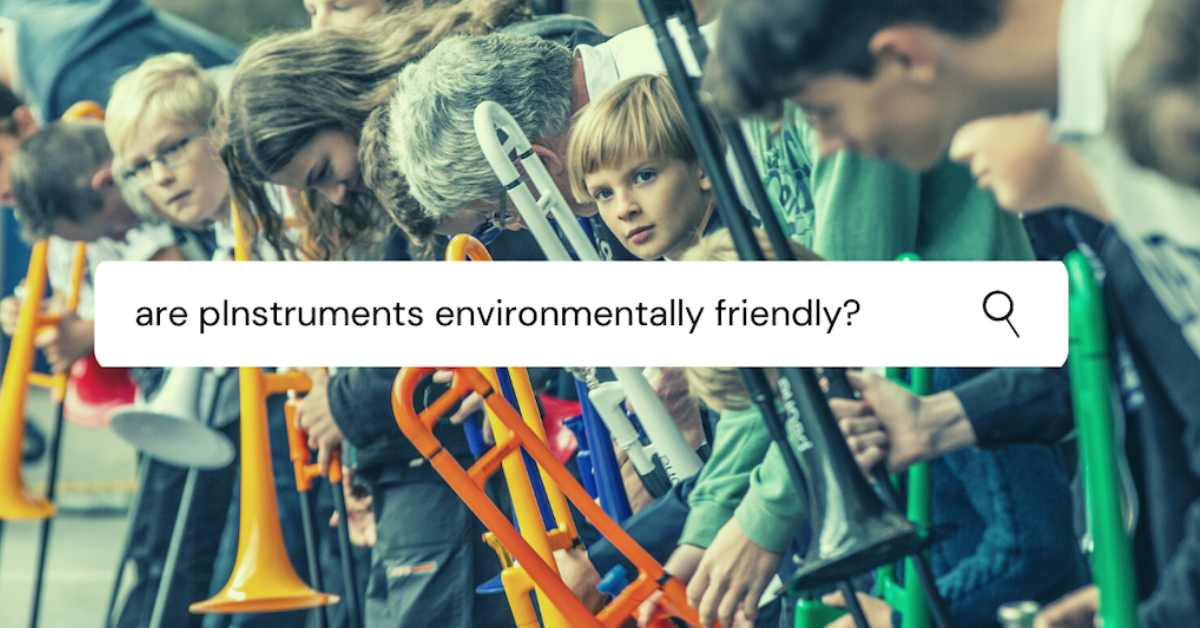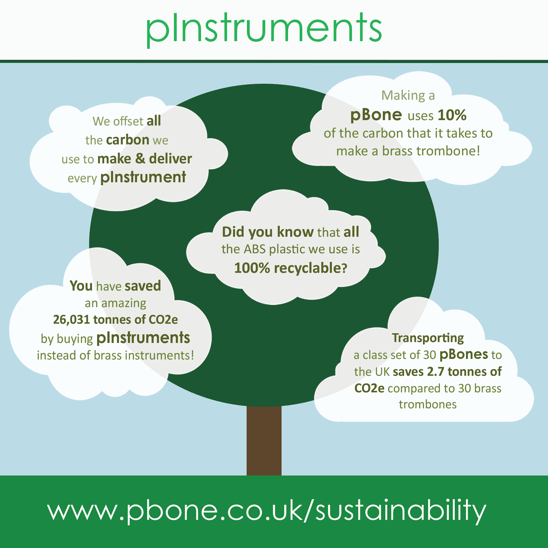Sustainable Musical Instruments: Can Plastic Make a Difference?
January 18th, 2023
3 min read

Life is full of big decisions…
Do you order the chocolate brownie or the red velvet cheesecake?
(Is both an option?)
Do you say “good morning” to the couple walking their dog around the local park, even though they both look grumpy, and you’ve not said a word to another soul today, and their dog looks...protective? Or do you look down and pretend to be super interested in your shoes?
(Or option three: clear your throat, get nervous, say nothing, and smile apologetically).
When buying a musical instrument, do you choose plastic or sustainable?
That is a big decision when we are buying a product. Because if we are thinking sustainable, plastic is the enemy...right?
Sure. Plastic that heads straight to the landfill is a terrible waste. Many of us are aware that plastic items like packaging and food takeaway wrappers are bad for the environment.
According to an OECD report, only 15% of plastic waste is collected for recycling. Compare this to the 50% that ends up in landfill sites. Add to that another 20% of incinerated plastic waste and the rest is sadly where plastic ends up in the ocean or uncontrolled dumpsites.
Musical instruments are another area where more can be done. These instruments are sometimes made with plastic and travel long distances as they make their way to customers around the world.
Not all instruments are made of plastic. But how sustainable are traditional instruments, such as those made of wood and brass?
When other plastic items like toys and appliances end up in a landfill, can plastic instruments be recyclable?
Are plastic instruments bad for the environment?
As a company that manufactures and sells plastic instruments, it’s a question we have asked ourselves a lot. It’s a question that customers and consumers are asking more and more too.
Steven Greenall, our CEO, has addressed some of the common queries about plastic musical instruments. But how can a plastic trombone (like our popular pBone) be better for the environment than a brass one?
For starters, the energy needed to manufacture brass instruments is much greater than manufacturing plastic instruments. Brass manufacture has been unchanged for centuries, and as such is incredibly energy inefficient. Compare this to plastic manufacture, and we start to see a huge difference: manufacturing a pBone uses just 10% of the energy needed to make a brass trombone.
Another key difference is in the weight. We designed our pInstruments with children and young learners in mind. Lightweight plastic had a significant advantage for smaller hands and getting children started with their instruments.
But there is another benefit: the lighter the instrument, the less energy is needed to transport instruments across the world. Add to this that supplies of zinc (used in brass instruments) are rapidly diminishing, and brass vs. plastic shows that there are, surprisingly, positives for picking a plastic musical instrument. What cannot be controlled here is that whatever instruments are made of, they are still made. And wherever they are going, they still need to get there.
One solution is to find out what your instrument manufacturer is doing to offset these carbon emissions.
At pBone Music, all our instruments are carbon neutral. We work with Carbon Footprint, the UK’s leading sustainability assessor and validator, to analyse the environmental impact of our products. Why? This allows us to discover ways we can adapt areas of business - such as packaging and transport - and offset our impact.
These are sustainable efforts, but sustainability is about more than offsetting our carbon footprint. Plastic that is manufactured and left in landfills is a major problem. Some budget instruments fit this category, but our pIntsruments are the exception.
All our instruments are constructed from ABS recyclable plastic. When a pTrumpet has tooted its last tune, it won’t end up on the scrap heap.
This sustainability goes beyond recycling. Making, transporting, and recycling an instrument that lasts for less than a year would still take a toll. That’s why our instruments are built to last. They are easy to repair, they are simple to maintain, and they can be used again and again. Our instruments can start one child’s musical experience, and another’s, and another’s.
We know that more can be done, both for our range of instruments and the entire music industry. As we work to achieve zero net emissions by 2030, we are constantly asking the tough question: can we do more?
Yes, we can.
But can plastic be part of the solution and not the problem?
Absolutely.
A plastic instrument that can be recycled is a better option than an instrument that will end its short life in a landfill.
A plastic instrument that has its carbon offset is a better option than another where emissions are not even considered, let alone calculated and addressed.
A plastic instrument that is lightweight and manufactured in the right way is a better option than a bulky instrument that has a bigger carbon footprint.
A plastic instrument that is manufactured to the highest standards is a better option than an instrument that will not stand the test of time.
When we make our buying decisions, sustainability will increasingly come to the forefront. And the more we ask difficult questions, the closer we will get to the answers. A plastic instrument might not be the only solution, but it can be a part of the journey towards it.
If you want to discuss sustainability in greater depth to suit your needs, book a virtual meeting to chat with our team.
Adam is the Content Manager at pBone Music. This should mean that he’s the ideal person to write about himself, but he finds boasting in the third person a little awkward. He honed his word wizardry with a degree in English Language and Literature at the University of Leeds. He has since written copy for clients and businesses across the land, from awards to something beginning with “z”. He also spent a number of years as a musician. He has written pop songs and even jingles for kids, performed more first dances at weddings than you could shake a pBuzz at, and once played a gig for a pie company at The Etihad Stadium in Manchester. When he’s not reminiscing about those good old days, you might find Adam enjoying the football (although as an Everton fan, that can be difficult). He also loves spending time with his partner, Jen, and his family and friends, and sincerely hopes they feel the same way.
Topics:
